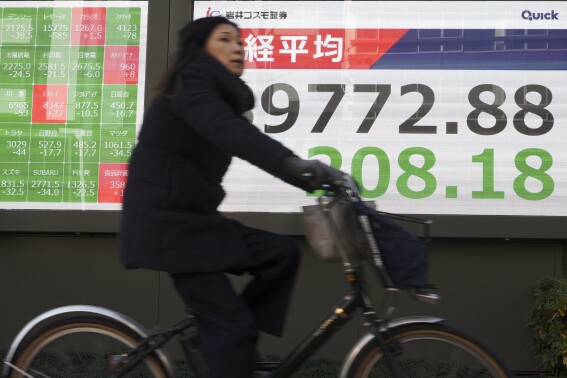HONG KONG (AP) — Asian stocks retreated on Monday after U.S. stocks fell as good news on the job market raised inflation worries.
Markets in Japan were closed for a holiday.
U.S. futures dropped while oil prices surged more than $1 a barrel after President Joe Biden’s administration expanded sanctions against Russia’s critically important energy sector over its war in Ukraine. The Biden administration said the sanctions announced Friday were the most significant to date against Moscow’s oil and liquefied natural gas sectors, drivers of Russia’s economy.
U.S. benchmark crude oil surged $1.50 to $78.07 per barrel, while Brent crude, the international standard, rose $1.44 to $81.20 per barrel.
China reported its exports grew at a faster pace than expected in December, as factories rushed to fill orders to beat higher tariffs that U.S. President-elect Donald Trump has threatened to impose once he takes office.
Exports rose 10.7% from a year earlier. Economists had forecast they would grow about 7%. Imports rose 1% year-on-year. Analysts had expected them to shrink about 1.5%. With exports outpacing imports, China’s trade surplus grew to $104.84 billion.
But the upbeat data failed to boost the region’s stocks. Hong Kong’s Hang Seng dropped 1.3% to 18,820.46, while the Shanghai Composite lost 0.5% to 3,154.37.
“Adding to the skittish sentiment is the uncertainty over how Asian economies, especially China, will fare under the shadow of the incoming Trump administration’s ‘America First’ trade policies,” Stephen Innes of SPI Asset Management said in a commentary.
Australia’s S&P/ASX 200 dipped 1.5% to 8,166.40. South Korea’s Kospi shed 1.2% to 2,486.14.
On Friday, the S&P 500 tumbled 1.5% to 5,827.04, ending its fourth losing week in the last five. The Dow Jones Industrial Average dropped 1.6% to 41,938.45, and the Nasdaq composite sank 1.6% to 19,161.63.
Stocks took their cues from the bond market, where yields leaped to crank up the pressure after a report said U.S. employers added many more jobs to their payrolls last month than economists expected.
Such strength in hiring is of course good news for workers looking for jobs. But it could also keep upward pressure on inflation by keeping the overall economy humming. That in turn could dissuade the Federal Reserve from delivering the cuts to interest rates that Wall Street loves. Lower rates can not only goose the economy but also boost prices for investments.
The Fed has already indicated it’s likely to ease rates fewer times this year than it earlier expected because of worries about higher inflation. That’s in part because some officials are taking seriously the possibility of tariffs and other policies coming from President-elect Donald Trump that could worsen inflation.
Friday’s jobs report might not have been as strong as it appeared, given weakness in manufacturing.
Markets have been deflating after traders sent U.S. stock indexes to dozens of records last year, banking on a stream of rate cuts coming from the Fed. If fewer cuts materialize than expected, stock prices would likely either need to fall, or profits at companies would have to rise more strongly to compensate.
Insurance companies were also under pressure as wildfires continue to burn in the Los Angeles area. Many of the homes that have been destroyed were in expensive areas where the typical price can top $3 million, and such high-priced damage could eat into insurers’ profit. Allstate fell 5.6%, Travelers dropped 4.3% and Chubb lost 3.4%.
Delta Air Lines was able to fly 9% higher because it delivered a stronger profit report for the last three months of 2024 than analysts expected. The airline said it’s seeing strong demand for travel, which accelerated through the end of last year, and it expects that to continue into 2025.

